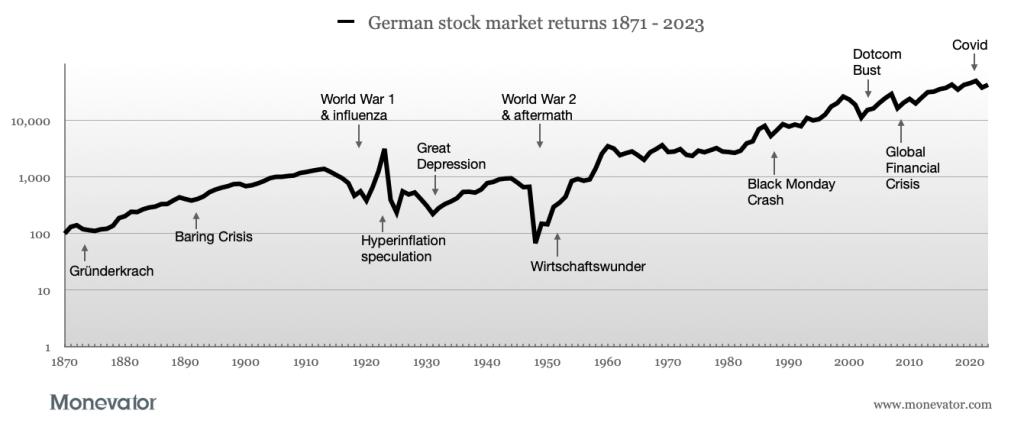
Like nearly every publication that talks about active investment ideas and strategies, our new Mogul membership articles will come with disclaimers.
Some may see this as a cop-out. Or as arse-covering.
And on the latter they’d be right, at least in our case.
Our articles cannot be personal financial advice or guidance. It should be obvious that an anonymous website with anonymous readers cannot give individual financial or investment advice.
But it’s not obvious to some people. Hence it’s prudent and important to have a disclaimer.
However I would object to the argument that it’s a cop-out.
It’s much more complicated than that – and as Monevator has always been about educating people in (excessive) depth, let’s get into why.
Capital at risk
To me, it seems pretty clear you shouldn’t expect to find can’t-miss winning lottery tickets in the guise of 2,000 word posts on a free or low-cost investing website.
Tens of thousands of people are paid six-to-seven-figure salaries to beat the market, and the vast majority of them fail over time. So don’t expect any better from a low-cost newsletter.
Nevertheless, as a past and present member of several investment info services myself, I’ve seen that – again – some people think otherwise.
Let me be clear: if you’re thinking of signing up to Moguls to secure a string of winning stock tips or market timing signals, then please don’t.
I say as much in the marketing. But if you missed it then please do feel free to cancel.
Because while I’m uncertain exactly how the content will pan out over the months ahead, I know a guaranteed way to beat 95%+ of investing professionals is not on the menu.
I’ll talk about my share ideas. Definitely! But I won’t claim they will be sure market-beating stocks.
This is not arse-covering. If you’re the type who’ll be at home with Moguls, then it should be common sense.
Investing: I did it my way
Now, you might be wondering exactly what kind of self-defeating message I’m delivering here?
Are we over-subscribed with members already? Because as a pitch to sign-up, I can see this seems straight out of Reginald Perrin’s playbook for ‘Grot’.
But not so fast.
If I wasn’t writing Moguls myself then I’d be joining it. Truly! This blog has been around for 17 years, and I’ve got to know and like its writers’ style and perspective…
And as for myself, for more than 20 years I’ve learned almost everything I know about investing from such articles, as well as books, forums, Tweets, and even the occasional YouTube video.
Not to mention the thousands of company reports and updates I’ve digested.
Without all this material made available for mass consumption, then I’d be none the wiser.
Indeed, for many of us investing would remain the preserve of opaque professionals charging a fortune for exposure to the markets.
(Without public information how would we even learn about index funds?)
Furthermore, I personally believe the right kind of person – with the right mindset and more than a little effort – will do better picking their own stocks and funds than by paying the average advisor or fund manager to do it for them.
Partly because it can be cheaper. Partly because we can be more nimble. But mostly because you and they have different incentives – you care much more about you – and different time horizons.
You have to love the challenge though, because the thrill of the game is the only certain payoff. And it helps to be a little obsessed and weird, too.
That’s all a long way from saying that I believe any particular article – mine or anyone else’s – should be taken a personal directive to buy and sell.
Learn to fish for yourself
The point is to read and learn as much as you can – with an increasingly discerning and skeptical eye – to make ever-better investment decisions for yourself.
As Morpheus in The Matrix might put it, by the time you’re able to fully parse an investment idea, the last thing you’ll want to do is to follow it blindly.
And that is where I’m hoping to contribute with my Mogul articles for Monevator.
Information and education – and imparting what I think and I’ve learned, for what it’s worth – partly illuminated with examples of where I’m investing and what I’m seeing.
Nothing more. But nothing less, either.
Reasons to be wary of everything you read
Let’s really ram this home by running through a laundry list of why it’d be silly to think a sensible route to riches is to invest blindly based on stock tips you get via email or on the Web.
Firstly, investing skill is rare (and may be non-existent)
The biggie. It’s been widely shown that the ability to beat the market through stock-picking is at the very least uncommon. Even winning fund managers tend to mean revert over time.
And while I’ve seen research that finds professional managers might slightly outperform in aggregate before fees (with less skillful punters making up the difference in this zero-sum game) such an edge is evidently unevenly distributed. (A subset of managers mop up the pre-fee wins).
Which is exactly why most people should invest the bulk of their money passively in index funds.
Now, given skill is rare, what are the chances that you’re reading the fundamental analysis of someone who has it?
The Seeking Alpha website has had 17,000 contributors over the years. I’m not aware that any have turned out to be the next Warren Buffett.
Other investing opinion outlets are similarly diverse.
As I said in my introduction, that doesn’t mean I think these articles are useless for those who invest actively – whether as a hobby or to try to beat the market.
But it’s obviously naive to think they are all serving up winning share ideas.
As for me, do I have skill? My own jury is still out. My confidence was shaken by a rotten 2022.
So read my stuff with that in mind. I may prove to be at best a lucky coin-flipper.
Winning stocks are heavily skewed
Anyone who has run a traditional stock portfolio for a long time knows that a small number of their decisions will deliver the majority of their returns.
The father of value investing Ben Graham generated most of his excess returns from a single growth stock, GEICO.
My own portfolio’s performance was strongly juiced by a couple of multi-bagging shares. (And it should have been further boosted to the moon by one that I fluffed, Tesla.)
Small cap investment writer Richard Beddard has commendably published a market-beating stock portfolio for years. You can see that just a handful of his selections delivered much of the returns.
And as we’ve covered before, an analysis by academic Henrik Bessembinder found only 4% of stocks delivered all the US stock market outperformance over one-month bills since 1926.
Or look at the US index today. Apple had grown to comprise more than 7% of the S&P 500 over the past 15 years. That’s a lot of index points that one behemoth has put on the board.
Run your winners, as they say.
Certainly that’s one takeaway. But another – more relevant for this discussion – is that statistically most stock ideas you read are more likely to come from Bessembinder’s mediocre 96% than the winning 4%, especially over the long-term.
The legendary stock picker Peter Lynch said: “If you’re great in this business you’re right six times out of ten. But the times you’re right, it overcomes your mistakes.”
Even clinical and emotionless quant funds are wrong all the time (albeit often with only small amounts of capital at risk with any particular trade).
Of course there are many ways to approach the market. Modern systematic or multi-asset fund managers staffed by should-be rocket scientists are playing a very different game to a traditional equity fund manager, with different risk and reward profiles.
Even so, an insider at the legendary hedge fund Renaissance Capital once revealed the firm started to find its edge when it was right about medium-term trades just 50.75% of the time.
On the back of that tiny win ratio was built the greatest wealth-compounding machine of all-time, with average annual returns well over 60%.
The bottom line: most stuff you read about will not beat the market, regardless of who wrote it. A minority of shares deliver the majority of returns. Even if you’re reading something written by a rare person with skill, there’s a high probability they’re talking about one of their duds. So most ideas you read about will probably lose to the market.
Common sense: what is realistic for the price of a pint?
Monevator Mogul membership is an extra few quid over the passively-orientated Mavens.
I will try hard to deliver a deep and interesting or educational article every month for members. And of course I hope to share some profitable ones. Though as I said, no promises.
But ask yourself…would I be giving away sure market-beating investment ideas for £5 a month?
Spoiler: no.
If I had such a golden goose, I wouldn’t even be working in the lucrative – and market-laggard infested – financial services industry.
I would borrow heavily and care for my goose on my own account.
Back in the real world, while I’m happy to put my interest-only mortgage where my mouth is, I do not believe I have an invincible formula or brain or strategy or time machine to inevitably beat the market.
Hence my aim with Moguls is to share ideas. To get you and me thinking better and more creatively about our investing. And to be there month in, month out, so that we learn together over time.
I’m looking for comrades, not customers.
A lot of the people who have signed-up to Moguls say they’ve done so simply to support our wider Monevator mission. We couldn’t be more grateful!
But I hope those who love the active investing game like I do will also enjoy the journey.
Incentives and career risk
“Show me the incentive and I’ll show you the outcome,” says Charlie Munger.
This statement is true almost everywhere in life, and clearly with investing.
Have you ever seen an advertisement for an active fund that mentions how most fail to beat the market? They don’t even talk about their rivals failing. Better not to bring the subject up.
That’s because the incentive for most money management shops is not to outperform. It’s to gather all the assets they possibly can. They will then take a percentage of the money they run, to some extent regardless of how well they do.
These people are not dumb. They are as aware as anyone of how hard it is to beat the market. So they naturally bury that difficulty deep in the messaging.
The Behavioural Investment blog just ran an interesting piece on the things that managers should say but don’t.
Some relevant ones include:
“We are managing too much money, it’s probably not in your best interests to invest with us.”
“Our recent strong performance is totally unsustainable.”
“I have to admit, we have been incredibly lucky”.
“Our new CEO is really focused on improving short-term performance.”
“The performance fee structure means that I can become very rich, even if I underperform.”
For a fund manager, keeping their lucrative job is the top priority. They will typically speak and act – and even think, rife as they are with cognitive dissonance – accordingly.
But I don’t get off the hook! What are my incentives with Moguls?
I’ll want to keep you subscribed, where possible. So I’ll want to keep you interested.
Even if I felt the same single stock had the best chance of beating the market every month, I’d be unlikely to only write about it again and again. I’d fear you’d get bored or feel short-changed.
What if I saw no good ideas, for months on end?
I hope I’ll say so. We’ll see.
Elsewhere, like everything else the wider investing media strives to get your attention.
What will Google searchers click on? What stocks are held by the most people, and so are of the greatest interest? What’s the point of discussing an obscure small cap if nobody clicks to read it?
Our membership articles will be behind a paywall. They won’t suffer from the clickbait curse. But it’d be overly-innocent not to imagine that other forces won’t shape our editorial instead.
Only you know what’s going on in your portfolio – and your life
Only you know how much money you have. How secure your job is. That you have two kids and a partner who is out of work. That you just paid off your mortgage – or you just took out a new one. You’re 35-years old. Or you’re 70-years old. You hate risk. Or you eat risk for breakfast. Your individual stock picks are made in a fun side-account with just 5% of your portfolio. Or you’re (very ill-advisedly) trying to catch-up on many years of not saving by striving to beat the market, fast.
Given all that, it should again be clear that any investment article is not speaking to you.
If you go to a professional and qualified financial adviser – ideally paid a flat fee, by the hour – and they talk through your aims, look at all your finances, understand your tax situation, and invoice you £3,000 at the end of it, then you’re entitled to believe you got personal financial advice.
If they didn’t then that’s not what you got.
Were I to say the consumer goods company Unilever – the maker of Dove soap and Ben & Jerry’s ice cream – is ‘low-risk’, then I’d mean that compared to other companies its future looks more predictable, its cashflows more stable, and perhaps it has a stronger balance sheet.
I could turn out to be right or wrong about that. But either way I would not be saying anything about the risks to somebody cashing in their private pension to put all their money into Unilever in their SIPP.
I’d not be saying anything at all about what any individual might do.
Does everyone understand what I’m saying here?
You say worth a punt, I say risk-adjusted portfolio diversifier
Everyone is different, and is in a different situation.
So if you read somebody on Twitter or ADVFN or Seeking Alpha saying they’ve put £10,000 into an particular share, know that without much more information it should give you zero extra confidence.
Perhaps they’re multi-millionaires? Maybe they have 100 individual investments of that size?
On the other hand, maybe they have a five-stock concentrated portfolio. But even this doesn’t tell you much, if you don’t know much more. How old they are. Whether they will inherit a fortune from their parents.
Whether they’re idiots.
Sure, you can get a better feel with exposure over time – it’s why I hope my long record of at least showing up on Monevator will make our membership more appealing – but you can never be sure.
It’s your money. It’s your life. You must make your own financial decisions every time.
Welcome to the suck
Active investing began as an offshoot for me from passive investing. As I got ever more interested – those who know me might say obsessed – the index funds went, and the passion blazed.
Many of my favourite active investors have been great writers and sharers. I set up Monevator to write about my active investing, too.
Yet over the years it’s become painfully obvious that a majority of people should stick to tracker funds. Hence it’s felt counterproductive to talk much about active investing here, at the risk of diverting a typical reader from that path.
This is the prime reason why I added an active tier to our membership push.
Of course I want it to be an income stream too, but at least for the foreseeable future it’d be quicker and easier for me to do a couple of extra hours of my usual work a month instead.
No, I want a safe space to talk active investing. Without diverting the main message of our site.
Mogul material
Some of you nodded through all above. Those who did – and who are also a bit obsessed with investing – will hopefully enjoy Mogul membership for years to come.
Another of my aims with my articles will be to leave more people nodding than I found them.
But maybe it’s not for you? Absolutely no worries. Most people will do best to join our Mavens tier to enjoy, learn from, and support The Accumulator’s passive investing mission.
Let’s all enjoy our investing, whichever path we take and with our eyes wide open.
The post Too good to be true: how to approach investment opinion, commentary, and third-party analysis appeared first on Monevator.
Table of content
- Learn to fish for yourself
- Firstly, investing skill is rare (and may be non-existent)
- Winning stocks are heavily skewed
- Common sense: what is realistic for the price of a pint?
- Incentives and career risk
- Only you know what’s going on in your portfolio – and your life
- You say worth a punt, I say risk-adjusted portfolio diversifier
- Mogul material



